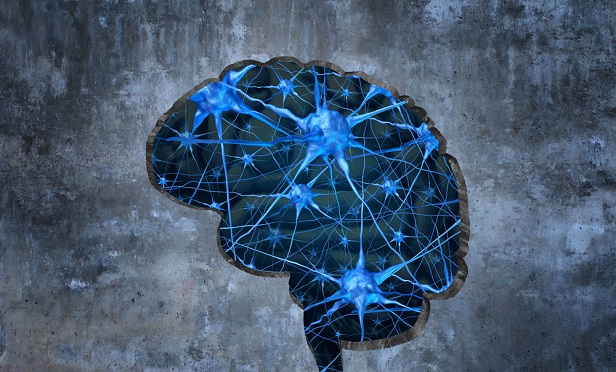 The study notes that thegrowth in diagnoses can be attributed in part to " the accumulationof people who are diagnosed with the condition and remain withinthe commercially insured population." (Image:Shutterstock)
The study notes that thegrowth in diagnoses can be attributed in part to " the accumulationof people who are diagnosed with the condition and remain withinthe commercially insured population." (Image:Shutterstock)
It appears that more young people are showing signs ofearly-onset dementia and Alzheimer's – but more research needs tobe done to verify what's happening – and why, according to BlueCross Blue Shield Association report, "Early-Onset Dementia and Alzheimer's Rates Grow forYounger Americans."
|From 2013 to 2017, diagnosis rates of both forms of dementia inpeople aged 30 to 64 rose by 200 percent, to 131,000, among 48million commercially insured members of Blue Cross Blue Shieldcompanies. Broken down by age segment, the number diagnosed withthese conditions increased 373 percent among 30- to 44-year-olds,311 percent among 45- to 54-year-olds and 143 percent among 55- to64-year-olds.
|Related: Dementia cases expected to triple by2050
|But there is a caveat to this analysis, according to theassociation: "The numbers in this report represent a point-in-timemeasurement of the diagnosis of early-onset dementia andAlzheimer's disease among commercially insured American adults 30to 64 years of age," the association writes. "Therefore, much ofthe growth in the diagnosis of these conditions over time can beattributed to the accumulation of people who are diagnosed with thecondition and remain within the commercially insured populationduring the study period rather than to an actual increase in therate of diagnosis year over year."
|Still, the report lists concerning statistics among thepopulation studied.
|Early-onset dementia and Alzheimer's disease are more common inwomen, as this group accounted for 58 percent of those collectivelydiagnosed with either kind in 2017. Diagnosis rates for bothconditions are rising in younger adults, with the average age ofsomeone living with either form of dementia now at 49 yearsold.
|"These health trends indicate a need for a focus on appropriatecare and support for individuals with either form of dementia andsupport for their caregivers as the disease progresses," theauthors write.
|Indeed, the association cites St. John's University research,which found that nearly 16 million family members and friendsprovided more than 18 billion hours of unpaid care to persons with Alzheimer's diseasein America, costing an estimated $221 billion.
|"These added caregiving responsibilities are felt particularlyby women, who make up 63 percent of this caregiving subset," theassociation writes in its press release announcing the report. "Theadded stress and time commitment these caregivers incur can alsolead to depression, social isolation and financial stress."
|The association's analysis also found that diagnosis rates ofearly-onset dementia and Alzheimer's disease are higher in theEast, the South and parts of the Midwest, while western states showlower rates of diagnosis.
|A particularly intriguing note within the report worthresearching more: "There is not a definitive test for early-onsetdementia or Alzheimer's disease, as diagnosis is primarily based onan individual's symptoms," the association writes. "As a result,people with early-onset dementia and Alzheimer's disease oftenundergo different forms of testing and treatment prior todiagnosis."
|Specifically, 86 percent of people with early-onset Alzheimer'sdisease received brain imaging in the year prior to diagnosis; 57percent of people with early-onset Alzheimer's disease filled anantidepressant medication in the year prior to diagnosis; and about40 percent of people ultimately diagnosed with early-onsetAlzheimer's disease were first diagnosed with early-onset dementia,cognitive or behavioral changes in the year prior.
|"The increase in early-onset dementia and Alzheimer's diagnosesamong a generation who typically wouldn't expect to encounter theseconditions for several decades is concerning, especially sincethere is no cure for Alzheimer's disease," says Dr. Vincent Nelson,vice president of medical affairs for BCBSA. "Further education andresearch is needed to learn more about early-onset dementia andAlzheimer's, how to treat these conditions and what can be done tobetter prevent diagnoses."
|Read more:
Complete your profile to continue reading and get FREE access to BenefitsPRO, part of your ALM digital membership.
Your access to unlimited BenefitsPRO content isn’t changing.
Once you are an ALM digital member, you’ll receive:
- Critical BenefitsPRO information including cutting edge post-reform success strategies, access to educational webcasts and videos, resources from industry leaders, and informative Newsletters.
- Exclusive discounts on ALM, BenefitsPRO magazine and BenefitsPRO.com events
- Access to other award-winning ALM websites including ThinkAdvisor.com and Law.com
Already have an account? Sign In
© 2024 ALM Global, LLC, All Rights Reserved. Request academic re-use from www.copyright.com. All other uses, submit a request to [email protected]. For more information visit Asset & Logo Licensing.








